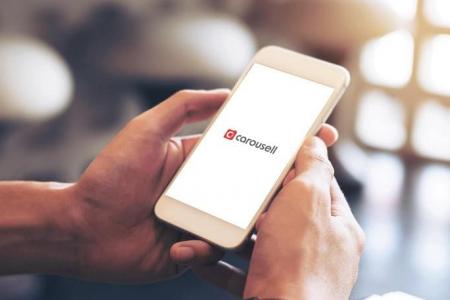New measures to protect Carousell users after at least $1.9m lost to fake-buyer scams in 2022
To tackle the recent rise in phishing scams in Singapore, Carousell will soon require all users who opt for mailing and delivery to transact solely within its platform.
This means that payments will be held in escrow and released to sellers only when buyers receive their purchases and are satisfied with the product.
On Monday, the online marketplace said this new requirement will be introduced within the next few months, with more details to be shared soon.
The measures come after at least $1.9 million was lost to phishing scams involving fake buyers on Carousell in 2022.
Victims who were cheated in such scams reported being contacted by fake buyers who sent them a link to a website or a QR code, claiming it was to facilitate payment for, or delivery of, the items on sale.
However, the link or QR code led to a spoofed website, and victims ended up revealing their Internet banking log-in details, bank card details or one-time passwords (OTPs), which the scammers used to make unauthorised transactions.
To tackle this scam variant, Carousell has been using artificial intelligence and machine-learning tools to detect and suspend users who send QR codes in high-risk scenarios.
Since mid-December, Carousell users have also been required to verify their mobile numbers before they can initiate a chat or make an offer for a product.
Carousell said: “Scammers constantly come up with new ways to deceive or manipulate victims to share their personal and financial information.
“Hence Carousell has been… proactively stopping bad actors from getting a chance to harm users, (taking) swift action on any evidence of fraudulent behaviour and driving user awareness about phishing scams.”
For instance, the accounts suspended for phishing attempts in November and December 2022 made up about 70 per cent of the total suspended accounts in the entire year, said Carousell.
The online marketplace is also piloting a new feature to reduce the risk of transactions. Under this programme, users can sell items such as mobile phones and luxury bags to Carousell for cash. It will then authenticate or certify these items before selling them to buyers.
Ms Su Lin Tan, senior vice-president of operations at Carousell, said: “We know buying high-priced second-hand items may be risky, so we are systematically introducing features to mitigate those risks and making the experience similar to that of buying new items.”
Carousell will also continue running an in-chat banner, which appears to warn users when they are chatting with accounts that are suspicious or have been suspended.
The online marketplace also reminded users to keep their transactions within its platform, noting how scammers try to direct the conversation elsewhere before their accounts are detected.
“By keeping your chat within Carousell, you will also be informed when the user you are talking to has been suspended,” it added.
Commenting on the new measures, Professor Lawrence Loh, a strategy expert from the National University of Singapore Business School, noted that by having users verify their mobile numbers, their identities can be traced by the authorities.
Prof Loh said that requiring customers who opt for mailing and delivery to transact solely within its platform would deter scammers given how most of them decline in-person meetings.
“This tightens a loophole that scammers exploit, since those who transact online make payment before they can inspect an item. However, even while meeting up, consumers should check their items carefully to avoid scams such as fake concert tickets,” he added.
Get The New Paper on your phone with the free TNP app. Download from the Apple App Store or Google Play Store now


